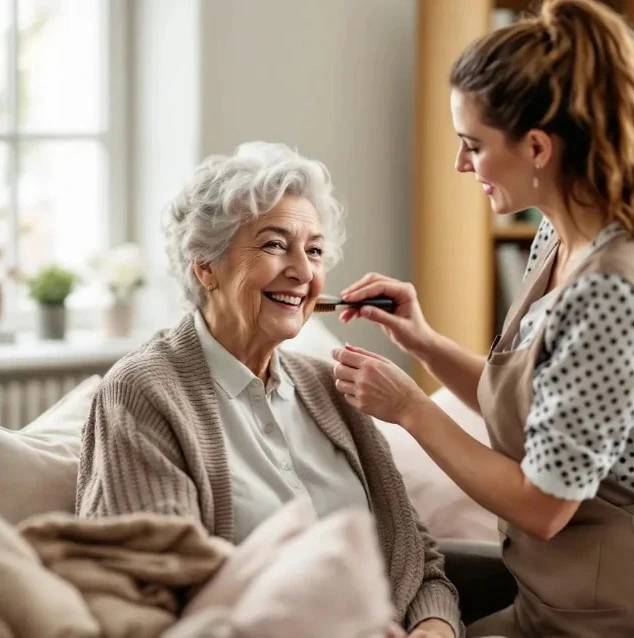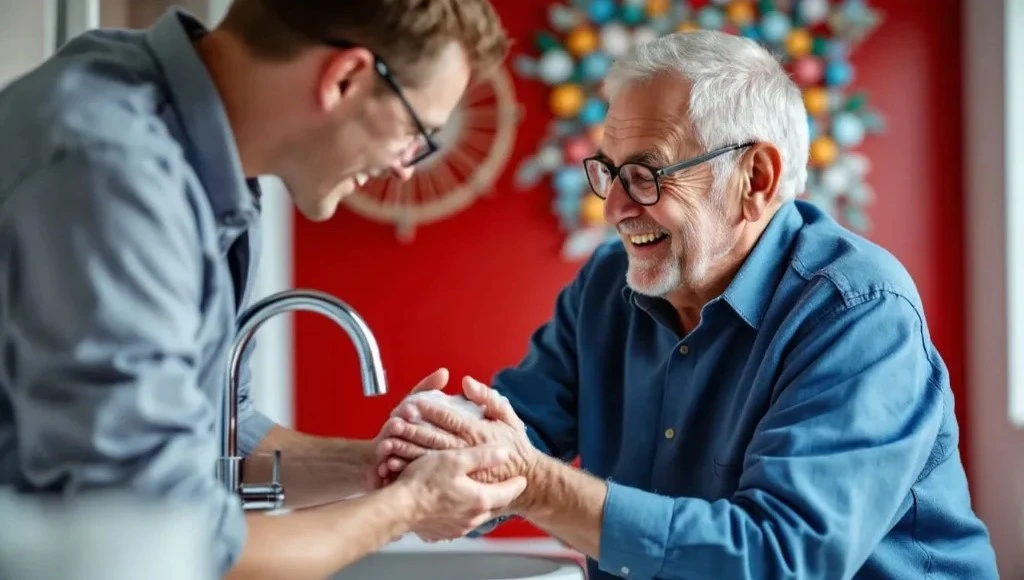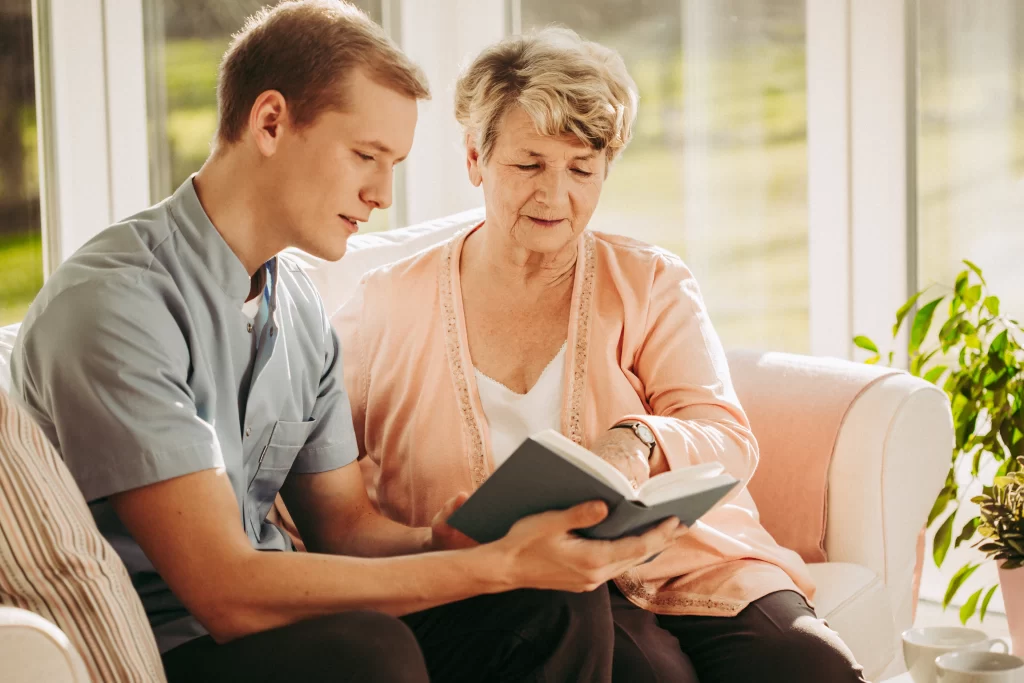Meaning of Personal Care
Personal care refers to the set of activities and practices that individuals undertake to maintain personal hygiene, grooming, and overall well-being. It involves caring for oneself to ensure a clean, healthy, and presentable appearance and maintaining good physical and mental health. Personal care routines can vary based on cultural, social, and individual preferences, but they generally include activities such as:
Personal Hygiene: This aspect of personal care emphasises maintaining hygiene and health. It includes regular handwashing, bathing or showering, brushing teeth, and overall body cleanliness to prevent infections and diseases.
Domestic Tasks: Personal care can extend to ensuring a clean and safe living environment. This may involve light housekeeping, tidying up, and maintaining cleanliness to create a comfortable and hygienic space.
Meal Preparation and Feeding: Ensuring that individuals receive proper nutrition is vital for their health. Personal care may involve meal preparation, considering dietary restrictions or preferences, and assisting with feeding, if necessary.
Mobility Assistance: Some individuals may require support moving around due to age, injury, or disability. Personal care may include helping with walking, using mobility devices, or transferring from one position to another.
Maintaining Personal Appearance: Personal care also emphasises maintaining a positive self-image and appearance. This includes hair care, shaving, makeup application, and nail care.

At the heart of personal care lies the idea of providing tailored assistance to those who may require help with essential activities due to age, health condition, disability, or any other circumstance. These activities go beyond the simple fulfilment of physical needs. It also addresses the psychological and emotional aspects of an individual’s life.
At its core, personal care fosters a sense of dignity, respect, and compassion while attending to various parts of a person’s daily life. One significant advantage of personal care is that it can be provided in the comfort of an individual’s home. Personal care is crucial in fostering self-esteem, confidence, and social interactions.
At Unique Community Services, we design person-centred care plans and provide compassionate personal care so that the people we serve can live a meaningful and independent life.
What Does a Personal Care Assistant Do?
Personalised care and support provided by personal care assistants or clinicians enable individuals to live their lives to the fullest. While friends and family members can offer help, personal care assistants play an exceptional role in ensuring independence and overall well-being. They go beyond task completion, becoming compassionate companions who prioritise trust, safety, and respect for the preferences and dignity of those they care for.
Personal care assistants excel in empathising with and understanding the unique needs of each individual they assist. Their exceptional communication skills foster deep connections, addressing not only physical tasks but also the emotional and mental well-being of the person under their care. This genuine human connection becomes a transformative force, enriching lives.
The focus of personal care assistants is on the well-being and satisfaction of the people they support. They create nurturing environments that encourage growth and comfort, promptly addressing concerns. Personal care assistants ensure that individuals receive comprehensive care that caters to their unique requirements, providing the support they deserve.
At Unique Community Services, our mission is to meet the unique needs of each person we serve and maintain their dignity and human rights. Through compassion, dedication, and a commitment to excellence, we strive to create a world where everyone can live their life to the fullest, regardless of their unique challenges.
What Are Personal Care Services?
Personal care services aim to assist people with everyday activities. These activities are tailored to meet the specific needs of individuals with difficulty performing them independently. Personal care services address physical needs and provide emotional support and companionship, improving the overall well-being of the individuals receiving the care.
For example, people with challenges in mobility may need assistance with bathing or walking. However, people with dementia may need support with medication management. Some people may need short-term care, whilst others might need long-term care. All this depends on the tailored personal care plan, and personal care plans are also reviewed and updated regularly.
Below, we explain personal care services and offer guidelines for personal care.
Appearance and Personal Hygiene
Appearance and personal hygiene are significant for individuals requiring personal care as they contribute to their physical well-being and boost self-confidence, social interaction, and overall quality of life.
Personal care assistants understand the unique preferences of individuals but also take the time to ensure their hair is clean and styled. Whether arranging visits to the hairdresser or accompanying individuals on a trip, their dedication to comfort and satisfaction knows no bounds. They go the extra mile to assist with makeup application, moisturise skin with gentle creams, and precisely monitor routines like shaving.

Regular oral hygiene maintenance is also essential. From daily mouthwash and brushing routines to scheduling necessary dental visits, personal care assistants understand that oral hygiene means reduced risk of infections and keeps the teeth and gums healthy. With their compassionate guidance, individuals can rest assured that every aspect of their well-being is in safe and caring hands.
Getting Up and Going to Bed
The importance of getting up and going to bed sets the tone for an individual’s entire day and night. A caring and supportive personal service ensures a smooth and comfortable transition for people requiring assistance, fostering a positive mindset to tackle the day’s challenges. Likewise, personalised care promotes relaxation and better sleep during bedtime, ensuring security and improving overall well-being and quality of life.
A personal care assistant monitors the morning and night-time routines and ensures that a person is supported when getting up from bed or going to bed.
When it comes to the morning, personal care assistants may help individuals select appropriate clothing, fasten buttons, and ensure that the individual is comfortable and appropriately dressed for the day. Personal care assistants can help with tasks like brushing hair, washing the face, and applying skincare products.
In the evening, a personal care assistant can help with bedtime preparations, such as changing into sleepwear, removing makeup, brushing teeth, and washing hands. Clinicians may assist with tasks like adjusting pillows, blankets, or any necessary assistive devices to promote a restful night’s sleep.
Bathing and Washing
Bathing, showering and washing are essential personal care services that play a crucial role in maintaining hygiene and promoting physical well-being for individuals. Proper hygiene not only prevents infections but also enhances self-confidence, allowing individuals to engage in social interactions with comfort and dignity.
Whether someone needs help with bathing and washing depends on their care plan. A clinician will always respect the dignity of the person they serve. Clinicians provide physical support when a person gets in and out of the shower to prevent the risk of slipping and falling. The support may also include adjustments to the bathroom to make things easier and safer for people who get this care service.
Dressing and Bed Positioning
Some people have challenges with getting dressed and undressed because of difficulty with fine motor skills and limited mobility. Proper dressing not only boosts self-esteem but also ensures that individuals can engage in daily activities with ease. Personal care assistance involves helping individuals with the process of selecting and putting on appropriate clothing. The goal is to help individuals dress comfortably and confidently while promoting independence and personal style.
Some individuals with complex care needs may spend more time on bed rest and may have difficulty with bed positioning. Appropriate bed positioning supports proper body alignment, preventing discomfort and potential health challenges. The personal care assistant ensures that people move frequently and encourages them to stretch as much as possible. They also ensure that the individual is comfortable. With this support, people reduce the risk of getting bed sores.
Assisting with Toileting
Assisting with toileting is a crucial personal care service that preserves dignity and maintains hygiene for individuals who need support. This service ensures comfort and reduces the risk of accidents, contributing to the well-being and confidence of those receiving care.
Following infection control protocols and maintaining a clean and hygienic environment throughout the process is essential. Some of the tasks that the personal care assistants need to undertake are regular pad or catheter bag changes, monitoring and encouraging toileting, and assistance.
Personal care assistants can offer gentle reminders to encourage individuals to use the bathroom regularly and maintain a healthy toileting routine. Additionally, these assistants are trained to recognise any signs of potential issues, such as urinary tract infections, and communicate these concerns to healthcare professionals.
Help with Housework Duties
Personal care assistants offer valuable assistance with various housework duties, catering to individual needs and preferences. They can provide support on a daily, weekly, or periodic basis.
One crucial aspect of their role is cleaning, which involves various tasks such as dusting, vacuuming, and mopping. They tackle these chores to maintain a clean and comfortable space for the individuals they assist. Additionally, personal care assistants wash dishes, do laundry, and iron clothes, ensuring that the individual’s belongings remain clean and well-maintained.
Clinicians often extend their services beyond basic housekeeping. They readily undertake grocery shopping, ensuring that the household is well-stocked with essential items. Assistants possess the skills to prepare or cook food for the individual, considering any dietary restrictions or preferences.
Preparing and Administering Medication
Personal care services cover preparing and administrating medication and attending any necessary appointments. Clinicians are trained in medication administration and follow specific protocols to prepare and administer medications according to the individual’s treatment plan. Some tasks include reading medication labels, organising medication schedules, and ensuring medications are properly stored and maintained.
Clinicians may remind individuals to take their medications at certain times and document the administration accurately. They may also monitor for potential side effects or reactions and report them to healthcare professionals. It’s important to note that administering certain medications may require specialised training and certification. Collaboration with healthcare professionals or licensed nurses may be necessary in some cases.
Companionship
Loneliness, depression, and social isolation can affect anyone, and clinicians play a crucial role in providing companionship to the people they serve, improving their overall well-being. Companionship takes various forms and is tailored to the individual’s needs and preferences. It involves engaging in conversations to foster connections and alleviate feelings of isolation. Clinicians may also participate in activities such as exercising or playing games, which provide companionship and contribute to the person’s physical and mental well-being.

Additionally, clinicians support individuals in pursuing their interests and hobbies, creating opportunities for engagement and enjoyment. They may read with the person, go shopping together, or assist in attending community activities, enabling individuals to stay connected and maintain a sense of belonging. Clinicians play a vital role in accompanying individuals to medical appointments, providing emotional support and ensuring their medical needs are met.
Importance of Dignity and Privacy in Personal Care Services
People’s preferences for personal care activities are included in the care plan. However, some people may feel uncomfortable, embarrassed, or even frustrated when they get personal care services.
Personal care services should prioritise maintaining confidentiality, especially when assisting with personal hygiene, dressing, or medical procedures. Respecting privacy during these intimate activities helps individuals feel more comfortable, reduces anxiety, and protects them from unnecessary embarrassment or shame.
It also supports their physical health by providing a hygienic and safe environment for care delivery. Maintaining dignity and privacy is important in promoting overall well-being and preserving the autonomy of individuals receiving care.
Continue Living Independently and Confidently in Your Own Home With Unique Community Services
At Unique Community Services, we provide tailored care and compassionate support to the people we serve in the comfort of their own homes. We design personalised care plans catered to the unique needs and preferences of individuals.
Compassion and dedication are vital qualities of our clinicians, and they treat each person we serve with respect and dignity. With this approach, we can achieve our mission to enable people to be as independent as possible and confident enough to reach out and connect with their community.
Our services are regulated by the Care Quality Commission (CQS), the UK’s independent health and social care regulator. Our offices are located in Manchester and Bristol, and to learn more about our services, contact us today.